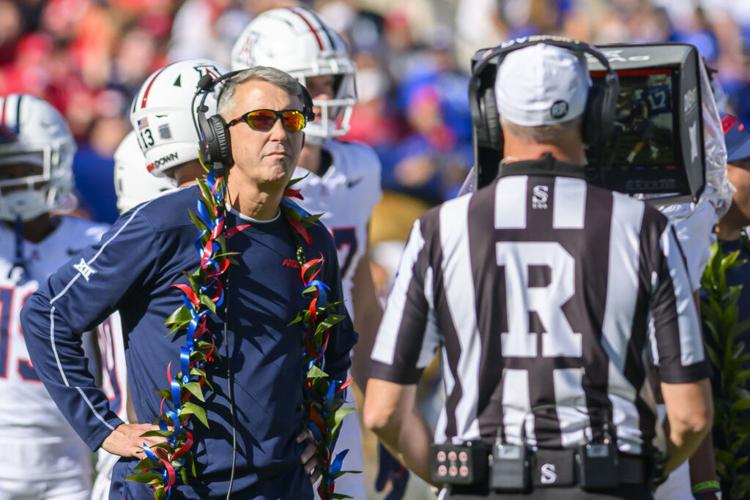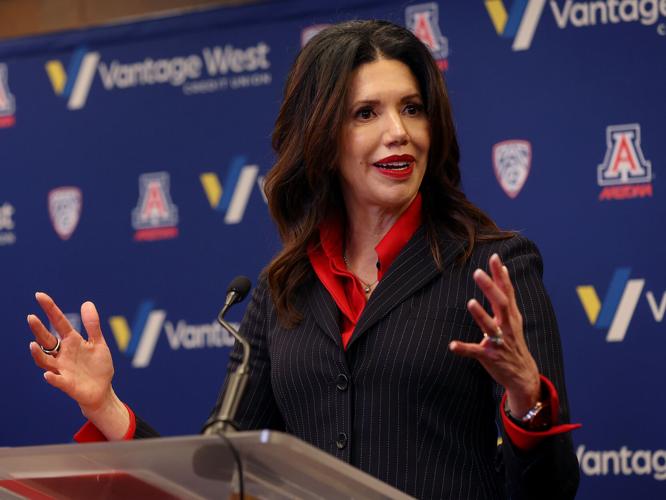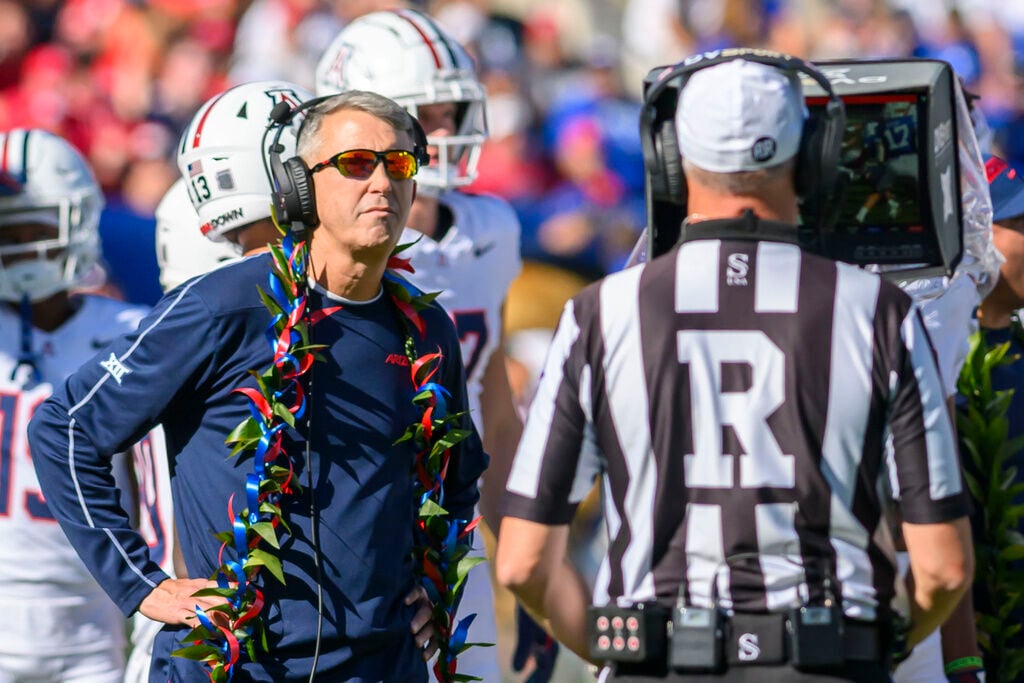Sometimes the unpopular choice is the right one.
Arizona athletic director Desireé Reed-Francois unquestionably made an unpopular choice this weekend when she committed to football coach Brent Brennan for 2025.
If you want to know how that went over, check out my timeline on the social-media platform formerly known as Twitter. All that’s missing are the torches and pitchforks (although Wildcat-turned-Sun Devil Jacob Kongaika might have one that you can borrow).
Reed-Francois made the right choice for today and for the UA’s particular predicament. She correctly reasoned that 10½ months is not enough time to accurately assess the performance of a head coach. She’s also well aware of the athletic department’s financial distress; she was brought on board to solve that very problem.
It would have been extremely difficult to justify paying another coach to not work here, even if some or most of that eight-figure bill — upwards of $20 million including assistant coaches’ buyouts — came from private donations. The optics would have been terrible. (Some will argue they couldn’t be worse than they are now. They forget the truly dark days.)
Whether Reed-Francois made the right choice in the long run remains to be seen. It’s up to Brennan to prove it.
He has a lot to prove.
No one can dispute that Brennan didn’t get it done in 2024. He inherited a team — well, most of a team — that went 10-3 the previous year … then crumbled under the weight of those great expectations. Picked to finish fifth in the Big 12 Conference, the 4-8 Wildcats ended in a tie for 13th. Worse, they withered down the stretch, barely competing in blowout losses to UCF and ASU.
Reed-Francois didn’t hire Brennan. Who knows what she might have done had she been in charge at the time. She did know him. But she’s worked with him for less than a year. She’s been deliberate in her evaluation of coaches. She has yet to extend any current coach in any sport since she got here, no matter how deserving they might be. (Tommy Lloyd’s extension was announced Feb. 19 — the same day Reed-Francois was hired.)
Reed-Francois told the Star that Brennan “deserves a fair chance to be successful” — and boy, let me tell you, the “fair chance” part of that statement did not sit well with fans in the social-media sphere.
Their assertion: He already had a fair chance. He was handed a top-15 team that brought back its quarterback (Noah Fifita), at least two projected first-round draft picks (Tetairoa McMillan and Jonah Savaiinaea), most of the offensive line and a standout secondary.
It’s a fair point. But it doesn’t paint a complete picture of what the roster actually looked like.
Arizona lost massive production to the NFL, graduation and the transfer portal — especially at the skill positions and along the defensive line. It was especially challenging to replace those players with a starting point of mid-January. Last year’s fall transfer portal window ran from Dec. 4-Jan. 2.
Brennan’s primary focus was on retention and that was the smart play. He kept most of the core intact.
Many believe he’ll never have a roster as talented as this one, but that’s only true to an extent. Arizona probably won’t have multiple first-rounders at one time again if history is any indicator.
But Brennan can build a team that’s deeper than this one. The Wildcats landed in the preseason Top 25 because of their top 25 or so players. Depth was always a concern, especially at key positions such as offensive tackle and cornerback. When attrition hit, the product suffered.
The Never Brenters will insist he shouldn’t have been hired in the first place — that the entire situation was rushed and that his résumé didn’t warrant a promotion to the Power Four.
Regarding the former, then-AD Dave Heeke had to act fast. If he didn’t, Fifita and McMillan likely would’ve been gone — and many others undoubtedly would have followed them into the portal.
Regarding the latter, Brennan led San Jose State to three seven-win seasons in his final four seasons there, including a 7-1 record during the pandemic year (when the Spartans had to practice several hundred miles away from campus). From 1993-2019, SJSU had three winning seasons.
Additionally, the Spartans ranked at or near the bottom of the Mountain West Conference in total football operating expenditures throughout Brennan’s tenure, per the Knight-Newhouse College Athletics Database.
Many of us theorized that if Brennan could do more with less at SJSU, he could do more with more at Arizona. That obviously didn’t materialize in Year One.
The Wildcats seem to be in a good place from a culture standpoint, something that also factored into Reed-Francois’ decision. Brennan is well-liked among players and their families. That doesn’t mean the team was well-coached.
Changes are needed, especially on offense. The system never fit the personnel. An identity was never established.
Reed-Francois said changes would be coming but deferred to Brennan to announce any staff firings. I asked her whether it was a mandate or something the two had agreed upon. She said they were “in alignment” on that issue. Stay tuned.
Rapid turnarounds are achievable in the current iteration of college football. Look at ASU and BYU. Both went from 2-7 in conference play to 7-2.
We live in a world where SMU is 11-1 in its first year in a power conference; where Indiana won 11 games for the first time in its history; where Vanderbilt has the same record as Oklahoma (both 6-6). Thanks to NIL and the portal, there’s an open invitation to college football’s parity party.
The programs that have risen rapidly might very well have better coaches and support systems. Reed-Francois insists Brennan will have every resource he needs. She knows how vital it is that football be successful; it generates roughly 64% of the athletic department’s revenue.
The next month will be critical. Brennan has to show he can not only retain but recruit. He has to inspire some degree of hope.
What does next year have to look like for Brennan to make it to 2026? The schedule is arguably tougher than this season; progress might not be evident in the win-loss ledger.
In lieu of that, the Wildcats must be more competitive. They must be tougher, sounder and smarter. Being more exciting wouldn’t hurt either.
Part of Brennan’s appeal was the possibility of stability. Unlike Kevin Sumlin, Brennan wanted to be here. Unlike Jedd Fish, Brennan wouldn’t be looking for the next-best job as soon as it opened.
But you have to produce to turn that ideal into a reality. Brennan hasn’t done it yet. He’s getting another chance to prove he’s the right man for the job. The clock is ticking.










